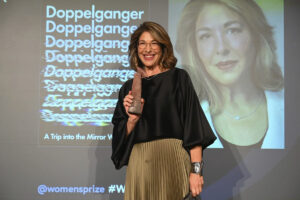Naomi Klein and VV Ganeshananthan Win Women’s Prize Literary Awards
LITERATURE, 17 Jun 2024
AP | The New Indian Express – TRANSCEND Media Service
Both winners referenced the conflict-clouded international situation, at a time when the arts world is grappling with divisions over the Israel-Hamas war and corporate sponsorship of the arts.
14 Jun 2024 – Author-activist Naomi Klein won the inaugural Women’s Prize for Nonfiction yesterday with “Doppelganger,” a personal account of her plunge into the world of online misinformation.
Its sister award, the Women’s Prize for Fiction, went to US writer V V Ganeshananthan for her novel “Brotherless Night,” about a family torn apart by Sri Lanka’s long civil war. Both come with 30,000 pounds ($38,000) in prize money.
Both winners referenced the conflict-clouded international situation, at a time when the arts world is grappling with divisions over the Israel-Hamas war and corporate sponsorship of the arts.
Klein, author of “No Logo” and “The Shock Doctrine,” delves into her experience being mistaken for Naomi Wolf, author of “The Beauty Myth” and more recently a promulgator of anti-vaxx ideas and other conspiracy theories. Part memoir and part reportage, “Doppelganger” — subtitled “A Trip into the Mirror World” — investigates how online life has distorted reality, and asks what might be done about it.
Historian Suzannah Lipscomb, who headed a panel of judges for the nonfiction award, called Klein’s book “a courageous, humane and optimistic call-to-arms that moves us beyond black and white, beyond Right and Left.”
Klein thanked the prize for “not shying away from controversy.” She has backed calls for book festivals to stop taking money from companies with investments in fossil fuels or Israel’s defense sector, a campaign that has led to U.K. events cancelling funding from finance firm Baillie Gifford.
Some argue that starves the arts of much-needed funds, but Klein said she “wanted to use the platform to call for more courage from cultural institutions.”
Ganeshananthan’s victorious second novel, which traces an aspiring medic’s journey through the brutality and moral uncertainties of war, took almost two decades to complete. Novelist Monica Ali, who chaired the fiction judging panel, said “Brotherless Night” is “a brilliant, compelling and deeply moving novel that bears witness to the intimate and epic-scale tragedies of the Sri Lankan civil war.”
Ganeshananthan’s first novel, “Love Marriage,” was published in 2008, and she started “Brotherless Night” in 2004. She said writing historical fiction “carefully and thoughtfully” about a traumatic conflict well within living memory that was true to people’s experience was “hard work.”
“It took such a long time because of the chorus of people it was necessary to talk to,” she said.
She said that faced with conflicts like the Israel-Hamas war, “what can writing do? Hopefully push people to collective actual action.”
The nonfiction award was launched this year to help fix the gender imbalance in the publishing world, where men buy more nonfiction than women — and write more prize-winning nonfiction books.
Prize organizers say that in 2022, only 26.5% of nonfiction books reviewed in Britain’s newspapers were by women, and male writers dominated established nonfiction writing prizes.
Both fiction and nonfiction prizes are open to female English-language writers from any country.
The fiction prize was founded in 1996, and past winners include Zadie Smith, Tayari Jones and Barbara Kingsolver, who won last year for “Demon Copperhead.”
Go to Original – newindianexpress.com
Tags: Literature, Naomi Klein
DISCLAIMER: The statements, views and opinions expressed in pieces republished here are solely those of the authors and do not necessarily represent those of TMS. In accordance with title 17 U.S.C. section 107, this material is distributed without profit to those who have expressed a prior interest in receiving the included information for research and educational purposes. TMS has no affiliation whatsoever with the originator of this article nor is TMS endorsed or sponsored by the originator. “GO TO ORIGINAL” links are provided as a convenience to our readers and allow for verification of authenticity. However, as originating pages are often updated by their originating host sites, the versions posted may not match the versions our readers view when clicking the “GO TO ORIGINAL” links. This site contains copyrighted material the use of which has not always been specifically authorized by the copyright owner. We are making such material available in our efforts to advance understanding of environmental, political, human rights, economic, democracy, scientific, and social justice issues, etc. We believe this constitutes a ‘fair use’ of any such copyrighted material as provided for in section 107 of the US Copyright Law. In accordance with Title 17 U.S.C. Section 107, the material on this site is distributed without profit to those who have expressed a prior interest in receiving the included information for research and educational purposes. For more information go to: http://www.law.cornell.edu/uscode/17/107.shtml. If you wish to use copyrighted material from this site for purposes of your own that go beyond ‘fair use’, you must obtain permission from the copyright owner.
